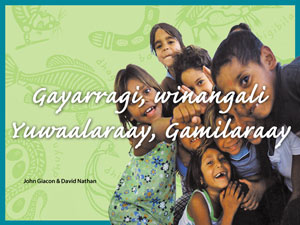Buffet style linguistic eating was available in Melbourne last week – first the Annual Conference of the Australian Linguistics Society, and then the Conference of the International Pragmatics Association’s annual conference. Galactic conference fees put IPRA out of many people’s reach (earlybird rego 350 Euros), but ALS still sticks to the cost recovery principle and makes sure the costs are low. Thanks to the La Trobe University organisers!
Australian Indigenous languages featured heavily at ALS: fieldwork, a whole session on the language Murriny Patha, papers on historical linguistics, word order and information structure… and the future of linguistic work at AIATSIS, and information about projects happening there. On non-Indigenous stuff, there was a brilliantly argued plenary by Anne Cutler (MPI and MARCS) on native listening – she has a book in progress which will be a must-read. I almost regretted not having followed a psycholinguistics path.
And there were good outcomes from the ALS AGM:
- The Society is continuing to support Pacific Linguistics, about the only place that continues to publish books on languages of our region that are properly copy-edited and don’t command galactic prices. (Disclaimer: I’m on the board)
- The Society is expressing its concern about the decision to close down bilingual education in the Northern Territory
- The Society’s journal AJL is going to appear more often, and is now ISI indexed which means
- better awareness of the work published therein
- more people will want to publish in it
- probably more work on Australian languages will be published, and will become better known
The first plenary at IPRA was also on Australian languages – Peter Sutton’s musings on how Australian Indigenous people’s beliefs and practices about languages have been altered by the move to settlement life, and how this leads to them speaking English, a creole or a lingua franca instead of their traditional language.
Sutton’s book, The Politics of Suffering was launched, and has been much discussed in the news. Gotta read it, because I bet the arguments are more subtle than their portrayal in the media. Another book has hit the streets and the media too — Nick Evans’ Dying Words: Endangered languages and what they have to tell us. Oh to have time to read them! Class preparation..sigh. Nick’s book has attracted a long and luscious piece from Nicolas Rothwell (The rest is silence (18/7/09). He mentions Nick’s joy in learning from speakers of other languages, but the piece exudes the melancholy of a healthy man at the burial of a distant acquaintance.
 Follow
Follow